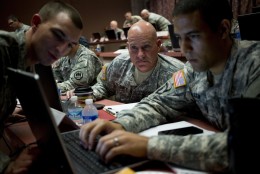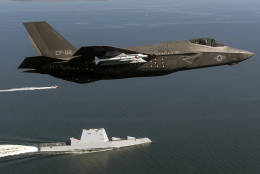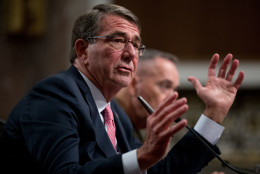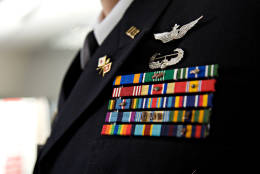Defense
-
The Army is currently experimenting with a concept it calls cyber support to corps and below (CSCB) — the notion that individual tactical units need to deploy with their own offensive and defensive cyber and electronic warfare capabilities and be prepared for an enemy that can and will use electronic attacks on the battlefield.
November 07, 2016 -
Terry Halvorsen, the DoD chief information officer, signed a memo on Oct. 18 requiring military services and agencies to trust each other when accrediting and authorizing systems.
November 07, 2016 Jon Harper, senior writer for National Defense Magazine, joins host Derrick Dortch to talk about the differences between presidential candidates Hillary Clinton and Donald Trump on defense issues. November 4, 2016
November 04, 2016-
Congress wants to tinker with TRICARE, but one expert says the military health plan is doing fine by itself.
November 04, 2016 -
The Navy is missing opportunities to turn connectedness into greater capability because its thinking is outdated.
November 04, 2016 -
Last month, the Army, along with the rest of the military services, announced all of the active duty cyber teams they’re building for U.S. Cyber Command have reached their initial operating capability and are ready for offensive and defensive missions. Next in line: teams made up entirely of National Guard and Army Reserve personnel.
November 04, 2016 -
The Lohfeld Consulting group ranked upcoming civilian and DoD contracts that meet three criteria: a likely 2017 request for proposal, likelihood of funding and awards next fiscal year, a significant pool of contenders.
November 03, 2016 -
Although recent conflicts haven't required the Marines Corps' storied amphibious capability. It remains an important asset. Dan Goure, vice president of the Lexington Institute, joins Federal Drive with Tom Temin to discuss whether the Navy is buying enough amphibious ships to fully support the Marine Corps.
November 03, 2016 -
Although Congress failed to set any productivity records this year, Senior Correspondent Mike Causey says it may OK three big-ticket items for federal workers.
November 03, 2016 -
Defense Secretary Ashton Carter announced a series of recruiting changes on Tuesday that he said would let the armed services recruit from a broader swath of the American population, rebuild lost ties with local communities and reduce growing misconceptions about military service.
November 02, 2016 -
As some of the best officers leave the Army, the service's personnel evaluation system is stuck in the 1950s and it's still years before anything can change. Federal News Radio's special report, The Army is Shortchanging its Future Force, shows the Army is starting to take steps to address the problem to meet its Force of the Future goals.
November 01, 2016 -
The election is thrown into turmoil, and members of Congress are calling for the FBI director's scalp. But other things are going on atop Capitol Hill. Like a threatened veto of the crucial National Defense Authorization Bill. Roll Call Senior Editor David Hawkings joins Federal Drive with Tom Temin with more.
November 01, 2016 -
Officers with advanced civilian degrees are getting pushed out of the Army. But they are the very people Defense Secretary Ash Carter wants in the military. The Army's aging personnel evaluation system may be to blame.
October 31, 2016 -
The Air Force is cutting ancillary and computer-based training so its airmen can have more time for family and profession development.
October 31, 2016 -
Here's a quick overview of the Federal News Radio's special report The Army is Shortchanging its Future Force.
October 31, 2016














